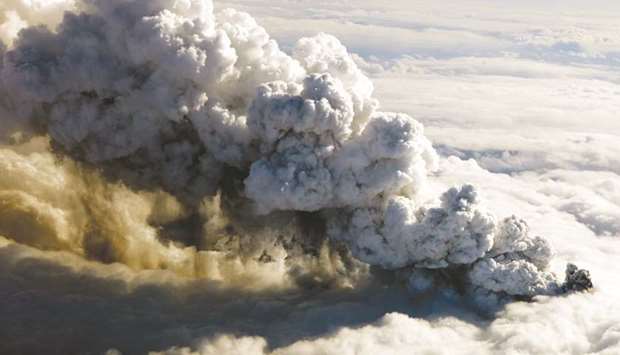The Icelandic cone-shaped volcano had caused a week-long disruption of air traffic in Europe, and resulted in more than 10mn passengers getting affected, 100,000 flights cancelled, and a cost exceeding $5bn to the global economy.
Total disruption at its peak meant nearly a third of total global air traffic capacity was thrown out of gear. In addition to direct revenue losses, airlines were likely to have faced higher costs too, including passengers’ re-accommodation, flight diversions and cancellations.
International trade got severely disrupted as a result of flight restrictions in the aftermath of the volcanic ash eruption.
The incident proved to us what modern life would be like without air transport!
The growing availability of affordable air travel has considerably widened aviation’s role in our society. Air travel is no longer a luxury commodity.
The air transport industry has not only underpinned wealth creation in the developed world, but has also brought enormous benefits to developing economies by unlocking their potential for trade and tourism.
The aviation industry supports an estimated $2.7tn (3.6%) of the world’s gross domestic product (GDP).
The world’s airlines carry over four billion passengers a year and nearly 62mn tonnes of freight. Providing these services generates 10.2mn direct jobs within the air transport industry and contributes $704.4bn to global GDP.
Compared with the GDP contribution of other key sectors, the global air transport industry is larger than both the automobile manufacturing sector and the pharmaceutical manufacturing industry.
In fact, if air transport were a country, its GDP would rank it 20th in the world, similar to that of Switzerland or Argentina.
Aviation provides the only rapid worldwide transportation network, which makes it essential for global business. It generates economic growth, creates jobs, and facilitates international trade and tourism.
Nearly 25% of all companies’ sales are dependent on air transport. More than 70% of businesses report that serving a bigger market is a key benefit of using air services, according to International Civil Aviation Organisation (ICAO).
Undoubtedly, air transport is an important enabler to achieving economic growth and development. Air transport facilitates integration into the global economy and provides vital connectivity on a national, regional, and international scale. It helps generate trade, promote tourism, and create employment opportunities.
Any disruption to global air transport means global economic growth and development will be curtailed.
Now looking at the impact of the Icelandic volcano disruption, while some of the disrupted trade could have been deferred, that was not the case for products that were either fast-perishing (fresh-cut flowers, vegetables such as green beans, exotic fruit) or crucial for just-in-time production processes (high-value items which are also low-weight such as electronic parts and machine components).
The impact on producers of flowers and fruit and vegetables in certain African countries such as Kenya, Zambia and Ghana was widely reported, with delays in transportation meaning large quantities of fast-perishing produce rotted, leading to losses for producers.
At that time, the World Bank had estimated that African countries lost $65mn due to the effect of the airspace shutdown on perishable exports.
The disruption to the transportation of these products resulted in lost revenue for producers and, in the case of just-in-time delivery, to customers who were reliant on the deliveries for the smooth operation of their plants.
Concerns over engine safety, post-volcanic eruption, caused an interruption in global air traffic to an extent not seen since the September 11, 2001, terrorist attacks on the Twin Towers in New York, and the largest breakdown in European civil aviation since World War II, Oxford Economics had previously noted in a report prepared for Airbus.
The closure of large portions of European air space over the week of volcanic eruption disrupted global travel, trade and business — demonstrating the integral role air transport plays in the basic functions of society and commerce.
Although Europe bore the brunt of the Icelandic volcano eruption, global economies too got badly hit as suppliers to the transport and hospitality sector suffered indirect losses.
Further, economic output was broadly reduced as lost employee income translated into lower downstream consumer and business spending.
According to recent estimates by the cross-industry Air Transport Action Group (ATAG), the total economic impact (direct, indirect, induced and tourism-connected) of the global aviation industry reached $2.7tn, some 3.5% of world’s gross domestic product (GDP) in 2014.
Clearly, air transport is a driver of global trade and e-commerce, allowing globalisation of production. Aviation’s advantage over other modes of transport in terms of speed and reliability has contributed to the market for “same-day” and “next-day” delivery services and transportation of urgent or time-sensitive goods.
Nearly 90% of business-to-consumer (B2C) e-commerce parcels are currently carried by air. The e-commerce share of scheduled international mail tonne kilometres (MTKs) grew from 16% to 83% between 2010 and 2016 and is estimated to grow to 91% by 2025.
To the extent that travel-related infrastructure is damaged or destroyed; the economic impact of natural disasters like the 2010 Icelandic volcanic ash eruption will last for a long time – potentially a number of years.
Pratap John is Business Editor and Chief Business Reporter at Gulf Times.


